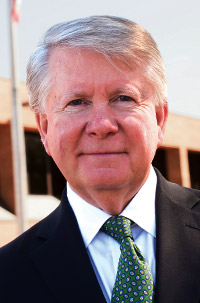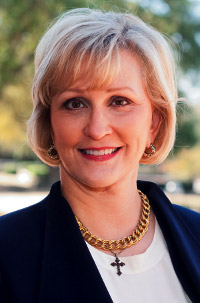|
Benefits Agency
Established benefits department
ready for growth under PPACA
Palomar's acquisition of benefits firm provides new opportunities
By Len Strazewski
Palomar Insurance Corporation President and CEO Tony Craft (far left) is joined by other agency executives. Front row: Karen Grace, Senior Vice President and Lane Milam, Executive Vice President, Sales & Marketing; Middle row: (from left) Sonya Berryman, Senior Vice President, Insurance Services; Becky Harbin, Vice President; and Len Skipper, Chief Operating Officer; Top row (from left): Account Executives David Logan and Hoke Sullivan.
Group medical benefits drive the employee benefits practice of most independent insurance agencies. Premiums increase annually; revenues grow steadily, making health insurance everyone's favorite insurance product.
But in Alabama, agencies struggle to build a traditional employee benefits practice. Blue Cross and Blue Shield of Alabama dominates the marketplace and is a direct writer--inaccessible to independent agencies and brokerages.
Despite the challenges, Palomar Insurance Corporation in Montgomery, Alabama, has built a prominent employee benefits practice--focused on ancillary benefits and employee-paid voluntary benefits. And agency executives look forward to growth in employee benefits opportunities as the Patient Protection and Affordable Care Act changes the marketplace next year.
President and Chief Executive Officer Tony Craft says the agency has been slowly building its employee benefits practice in response to changing client needs for several years but, thanks to the acquisition of an employee benefits specialty practice last year, is poised for dramatic growth.
"The insurance brokerage business has been changing steadily, creating new demand for more comprehensive expertise," he explains. "Ten years ago, we were all from the property/casualty insurance side of the business, but today we realize that we have to understand and service all areas of our field, including employee benefits."
Founded in 1954, the agency started as a property/casualty insurance specialist like many other agencies in the region, notes Craft. Industry specialties included construction, manufacturing, transportation, and food industries.
However, by the mid-1980s, employee benefits had become a small but mandatory area of service with two specialist employees, necessary to accommodate and retain existing property/casualty insurance customers.
"The insurance brokerage business has been changing steadily, creating new demand for comprehensive expertise … including employee benefits."

—Tony Craft
By the mid-1990s, employee benefits began to manifest as its own growth area, posing cross-selling opportunities as employers began to re-examine their employee benefits and diversify their benefits to match changing employee demographics.
Today, the agency has 82 employees and is the third largest independent agency in the state, with offices in Troy and Birmingham as well as Atlanta, Georgia. There are eight employees in the employee benefits department, including four producers, two marketing specialists and two customer service representatives.
Employee benefits business produced around $800,000 in revenue in 2012, and is expected to reach 11% of the firm's total revenues by the end of 2013.
Palomar executives note that in Alabama, however, employee benefits have not evolved in the same way as in the rest of the country. While the rest of the United States watched an increasingly smaller collection of health insurers compete with increasingly sophisticated plan designs and steadily higher rates, Alabama was for many years restricted to a single dominant carrier that had little competition.
As a result, group health insurance—usually the largest coverage area for benefits agencies around the country—is less than 1% of the Palomar book of business. The virtual monopoly of Blue Cross and Blue Shield of Alabama restricted the growth and development of the employee benefits practice at Palomar to ancillary benefits such as group dental insurance, vision care, group life, travel and accident insurance and disability insurance used by employers to round out their paid benefits package.
The agency also provides consulting in individual disability insurance, life insurance and estate planning.
"The Affordable Care Act will expand the market for group medical carriers in our state … And voluntary benefits will explode."
 —Karen Grace —Karen Grace
However, Chief Operating Officer Len Skipper notes that Palomar has also developed expertise in the fast-growing field of employee-paid voluntary benefits, including specialty health-related coverages such as catastrophic illness and cancer insurance, hospital indemnity insurance, long-term care insurance, short-term disability insurance and individual life and accident coverage. AFLAC is the largest underwriter of the voluntary program.
The agency is now in the second year of a five-year plan, Skipper says, and employee benefits is projected to grow to at least 20% of total revenues by the end of the strategic plan period. The voluntary benefit programs are the fastest-growing benefits product line for the agency and are likely to continue to grow at a rapid rate as employers re-examine their benefits programs under new Affordable Care Act regulations and seek to moderate anticipated increases in health insurance costs.
He also expects a growing interest in health insurance gap coverage designed to pay for high deductibles and co-insurance levels in the consumer-directed health plan designs that are most likely to be sold by the federally mandated state-run insurance exchanges. He also notes growing interest in group-rated voluntary programs that provide guaranteed issue at significant discounts from individual rates.
Another catalyst for growth in Palomar's employee benefits practice is the acquisition of Martin Grace Benefit Group, Inc., completed last year. A woman-owned employee benefits specialist firm, Martin Grace had clients ranging in size from small businesses to more than 30,000 employees and marketed a full range of employee benefit services, including group medical coverage for national clients.
The specialty agency also represented United Healthcare and Viva Health, a local Health Maintenance Organization (HMO) for clients that did not choose the local leader or who required multi-state coverage.
Lane Milam, CIC, is Executive Vice President, Sales & Marketing.
The acquisition brings a new level of expertise to Palomar, executives say, and will allow the agency to provide full-service employee benefits consulting and a wider range of benefit products. The acquisition also provides an entry into national group accounts and cross-selling of large property/casualty accounts.
Karen Grace, now senior vice president of employee benefits at Palomar, says the merger was prompted by the 2008 recession and the resulting need for better benefits planning and management by local employers. "In this economy in Alabama, employers had experienced some setbacks. The recession had hurt many businesses, leading them to rethink their business strategies and employee benefits management."
She says Palomar saw the acquisition of Martin Grace as a good fit and as a way of developing the comprehensive expertise the agency needed to compete in the post-recession economy. Grace will take the lead in developing benefits business from existing Palomar clients and new business generated by implementation of the Affordable Care Act.
"The Affordable Care Act will expand the market for group medical carriers in our state," as a state-operated insurance exchange opens to market individual and small group health insurance, she notes. "And voluntary benefits will explode as employers either eliminate or reduce group medical coverage and look to a broader range of voluntary benefits to fill in the gaps of the benefits strategy."
In preparation for the new wave of interest, Grace just added two new certifications from the National Association of Health Underwriters (NAHU) to her range of expertise: one dealing with PPACA health care reform and the other with voluntary benefits.
Sonya Berryman, CISR, is Senior Vice President, Insurance Services.
The acquisition and the expansion of the benefits practice also generates lots of new cross-sales opportunities for the agency, adds Lane Milam, executive vice president of sales and marketing. "There were a lot of new cross-selling opportunities prior to the Martin Grace acquisition, but it was hard to respond to all the opportunities our property/casualty producers would bring us. Until the acquisition, we had one benefits producer and a couple of new employees available to consult with prospective clients and work with them on plan design.
"Now it is working very well. We have much more depth in the benefits department and a lot more referrals that can lead to new business. And not just for the benefits department from the property/casualty department. Our new benefits staff is bringing prospective property/casualty insurance opportunities to us as well."
Milam expects the advantages of the benefits expansion to continue for more than a year or two. "As our producers become more comfortable with each other, we can expect them to work together as a team to attract clients that seek comprehensive service."
Milam agrees that the increased benefits resources also have the agency poised to take advantage of developments triggered by the Affordable Care Act. "In 2014, as the provisions of the Act become effective, our clients will have a greater need for our consultative resources. The Act provides strict penalties for noncompliance, so it becomes our responsibility to guide them to compliance."
Florida may also become a growth region, he says. With more producers available, the agency can make new inroads into its neighbor state, which has a more competitive group medical marketplace.
As the benefits business grows, so will the need for service, and personal service has been a Palomar trademark, notes Sonya Berryman, senior vice president of insurance services. The agency has two customer service representatives who specialize in employee benefits and a wide range of related services, including enrollment management, claims management and regulatory compliance.
"Our goal is to be as helpful as we can--and provide as much service as our clients need—or as little," she explains. However, with shrinking human resource departments and increased pressure for compliance with state and federal regulations, clients are demanding more and more attention from their insurance broker.
Palomar continues to be responsible for handling open enrollment periods for its clients, developing employee benefit communications and auditing documents and procedures for compliance, but it also trouble-shoots billing issues and claims concerns as well as providing office support such as data entry for benefits, as needed, Berryman says.
|